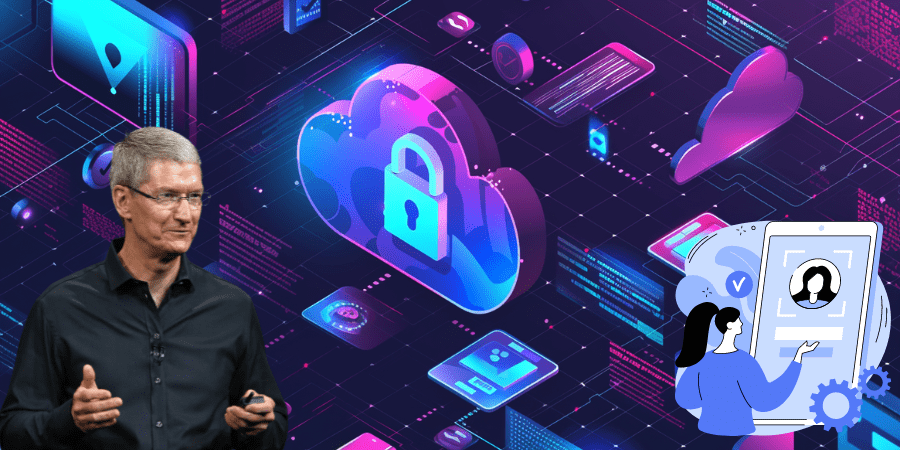Apple released its long-awaited artificial intelligence system, Apple Intelligence.
This cutting-edge technology is designed to customize user experiences and automate tasks, marking a significant leap forward for the tech giant.
CEO Tim Cook emphasized that Apple Intelligence will set a new standard for privacy in AI Apple’s Private Cloud Compute Technology.
Reflecting the company’s ongoing commitment to user security. While Apple touts its in-house AI as a beacon of privacy, its collaboration with OpenAI has raised eyebrows.
Critics point to past privacy issues with OpenAI’s ChatGPT, suggesting that it remains to be seen whether Apple can successfully balance innovation with robust data protection.
Background
Apple’s foray into artificial intelligence has been highly anticipated, and its partnership with OpenAI has brought excitement and scrutiny.
OpenAI’s ChatGPT, launched in November 2022, quickly became a prominent tool for natural language processing but was marred by privacy concerns.
ChatGPT collected user data without explicit consent to train its models, a practice that was only amended in April 2023 to allow users to opt out of data collection.
In light of these concerns, Apple has emphasized that ChatGPT will be strictly controlled and based on explicit user consent. The partnership will focus on isolated tasks such as email composition and other writing tools, ensuring that user data is handled carefully.
Despite these assurances, security professionals remain cautious, monitoring how these measures will be implemented and their effectiveness in protecting user privacy.
Apple has traditionally taken a more conservative approach to integrating new technologies into its products.

Apple has opted for a more deliberate strategy, unlike peers such as Google, Microsoft, and Amazon, which have aggressively pursued AI ventures and reaped investor confidence.
The company has spent years developing Apple Intelligence with proprietary foundational models, ensuring the technology aligns with its privacy-centric ethos.
As CEO Tim Cook explained, this careful approach was intended to apply AI responsibly and maintain the integrity of Apple’s commitment to user privacy.
Apple’s Approach to AI and Privacy
Apple’s entry into the generative AI race has been notably delayed compared to competitors like Google, Microsoft, and Amazon.
While these companies have quickly integrated AI into their products and seen their shares rise due to investor confidence, Apple chose a more cautious path.
Tim Cook, Apple’s CEO, explained that this delay was intentional, allowing Apple to apply AI technology in a responsible and privacy-focused manner.
The development of Apple Intelligence has primarily been an in-house effort, utilizing proprietary foundational models to minimize the amount of user data that leaves the Apple ecosystem.
This approach reflects Apple’s longstanding commitment to privacy, a core value the company has consistently prioritized. By building most of its AI technology with its resources, Apple aims to ensure that user data remains secure and private.
Apple Intelligence is designed to customize user experiences and automate tasks while maintaining robust privacy standards. The company’s strategy involves performing most AI processing directly on devices, reducing the need to send data to external servers.
When cloud processing is necessary, Apple ensures that only the data required for each specific task is transmitted, with solid security measures at each endpoint.
Despite these assurances, integrating AI while upholding stringent privacy standards presents unique challenges. Critics, including Elon Musk, argue that it is nearly impossible to maintain user privacy in the age of AI.
Musk has even stated that he would ban his employees from using Apple devices once the announced updates are implemented. Some experts believe Apple’s approach could set a new benchmark for balancing innovation and privacy.
Gal Ringel, co-founder and CEO of data privacy software firm Mine, praised Apple’s strategy, suggesting that the positive reception of their AI announcement indicates a growing value placed on privacy.
He pointed out that Apple’s emphasis on confidentiality could pay off, contrasting sharply with other recent AI product releases criticized for lacking foresight in addressing privacy concerns.
By taking a measured and security-focused approach, Apple aims to set new standards for the tech industry, showing that it is possible to advance AI technology while protecting user data.
Challenges and Criticisms
Integrating artificial intelligence into Apple’s product ecosystem while maintaining its rigorous privacy standards poses significant challenges.
AI relies heavily on large datasets to train and improve its models, which can conflict with Apple’s commitment to user privacy. Critics like Elon Musk have voiced skepticism about the feasibility of upholding privacy in AI development.
Musk even suggested that integrating AI into Apple’s devices could compromise user data to such an extent that he would ban his employees from using Apple products once these updates are implemented.

Apple’s partnership with OpenAI has been a focal point of concern. OpenAI’s ChatGPT has faced criticism for initially collecting user data without explicit consent, which has fueled doubts about the privacy implications of Apple’s new AI initiatives.
Despite Apple’s assurances that user data will be handled with explicit consent and used only for isolated tasks, security professionals remain vigilant, observing how these promises will be executed.
Security and Implementation
Apple has adopted a proactive approach to AI security to address these challenges. Unlike many tech companies that release products quickly and fix issues as they arise, Apple emphasizes “security by design.”
This approach involves anticipating and mitigating potential security risks from the outset rather than addressing them reactively.
Central to Apple’s strategy is its new Private Cloud Compute technology. This system is designed to perform most AI processing on the user’s device, minimizing the need to send data to external servers.
When cloud processing is necessary, Apple ensures that only the essential data required for each specific task is transmitted. This data is protected with robust security measures at each endpoint, and Apple commits to not storing this data indefinitely.
Apple also plans to publish all tools and software related to its private cloud for third-party verification, promoting transparency and fostering trust.
This move allows independent experts to scrutinize Apple’s privacy claims and verify that the company upholds its high standards.
Krishna Vishnu bhotla, vice president of product strategy at mobile security platform Zimperium, highlighted the significance of Apple’s approach.
He described Private Cloud Compute as a “noteworthy leap in AI privacy and security,” particularly praising the independent inspection component.
Private Cloud Compute Technology
Its groundbreaking Private Cloud Compute technology is at the core of Apple’s privacy assurances for its AI initiatives. This system is designed to balance the intensive processing needs of AI with the company’s rigorous commitment to user privacy.
On-Device Processing
Private Cloud Compute aims to perform most AI processing directly on users’ devices. By doing so, Apple minimizes the need to transfer data to external servers, significantly reducing the risk of data breaches and unauthorized access. This approach aligns with Apple’s long-standing focus on device-based security, ensuring that sensitive user information remains within the secure environment of their personal devices.
Cloud Processing with Enhanced Security
Private Cloud Compute leverages cloud resources for tasks requiring more processing power than a device can handle.
- Minimal Data Transfer Only the data necessary to complete each request is sent to the cloud. This minimizes the exposure of user information.
- End-to-End Security Apple employs robust security measures at each endpoint of the data transfer process. This includes encryption and secure data handling protocols to protect information in transit and at rest.
- No Indefinite Data Storage Data processed in the cloud is not stored indefinitely. Apple ensures that the data is promptly deleted from the cloud servers once the processing is complete, reducing the risk of long-term data exposure.
Transparency and Third-Party Verification
Apple will publish all tools and software related to Private Cloud Compute for third-party verification to build trust and demonstrate its commitment to privacy.
This transparency allows independent security experts to scrutinize Apple’s claims and verify that the company is adhering to its privacy and security promises.
Apple aims to foster greater confidence among users and the broader tech community by inviting external audits and assessments.
Industry Impact
Krishna Vishnubhotla, vice president of product strategy at mobile security platform Zimperium, has highlighted the significance of this innovation.
He describes Private Cloud Compute as a “noteworthy leap in AI privacy and security,” emphasizing the importance of the independent inspection component.

This transparency and commitment to rigorous security standards not only enhance user trust but also set a new benchmark for the industry.
Apple’s introduction of Apple Intelligence aims to set a new standard for privacy in AI. By leveraging Private Cloud computing technology, Apple ensures most AI processing occurs on devices, reducing the need for data transfer.
When cloud processing is necessary, only essential data is transmitted, protected by robust security measures, and not stored indefinitely.
Transparency through third-party verification further enhances trust. While challenges and criticisms exist, Apple’s proactive and security-focused approach positions it as a leader in responsible AI development, balancing innovation with stringent privacy standards.


